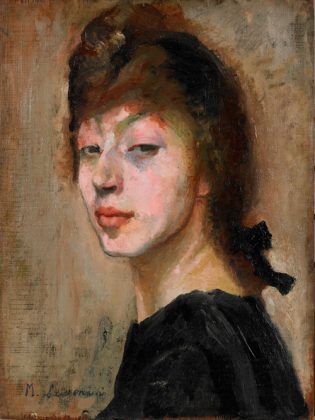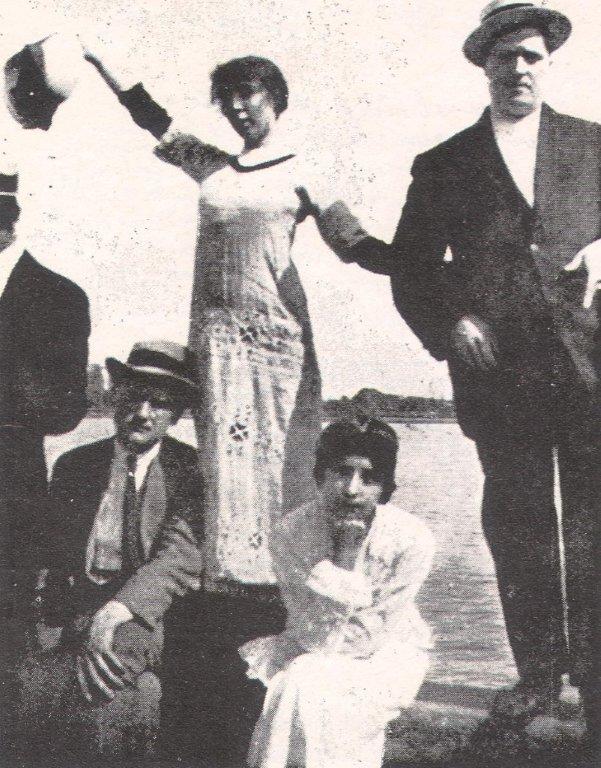Le Pont du Nord (as sung by Germaine Montéro)
Je n’ai pas pu payer ma taule.
Je dois deux semain’s et ma clé
N’ouvrira plus la rue des Saules:
Ainsi l’a voulu le taulier.
La neige tomb’, c’est grand’ vacherie
Dans l’ciel, sur la terre et sur moi.
Le froid mord dans mes joues maigries
Et me ronge le bout des doigts.
Ma mèr’ m’a dit, il y a longtemps,
— «C'est sur le Pont du Nord qu’Adèle
Ta soeur aînée a foutu l'camp
Pour danser la java rebelle
Loin des conseils de ses parents.
C’est là qu’ell’ perdit sa ceinture,
La vie et l’air de la chanson.
Les Rabouin’s, la Bonne Aventure,
Tout ça c’est de l’accordéon.»
Quand ma mère eut fermé la bouche,
Mon premier soin, ru’ Durantin,
Fut d’aborder une Manouche.
On peut dir’ qu’elle tombait bien.
Sa jupe à volants était mûre;
Elle a regardé dans ma main
Et m’a dit la Bonne Aventure
Devant la port’ d’un marchand d’vin.
—«Tu seras marié pour toujours
Avant que la lune se couche
Dans la lumièr’ du petit jour
Tout d'suite après ta premièr’ touche:
Car c’est ainsi que naît l’amour.
Tu me paieras à la prochaine…
Es-tu rassuré’ sur ton sort ?
Il est au bout du Pont des Peines,
Autrement dit le Pont du Nord. »
— «Monsieur, demandai-je à tout l'monde,
Où se trouve le Pont du Nord?»
Les uns disaient: Au bout du monde
Et d’autres: Au bout du corridor.
Dans les neiges indifférentes
J’ai aperçu le pont brumeux.
Il n’avait pas de main-courante
Et frôlait le fleuve et les cieux.
Le vent, tel un homme en folie,
Bouscula les points cardinaux;
Et la neige fondit en pluie
Pour mieux vous refroidir les os.
Et la chair promise au tombeau
La fille aperçut-elle un signe
Qui lui fit entrevoir les corps
Des mal marié's à la dérive ?…
Ce n'est plus de notre ressort.
Le Pont du Nord
Can’t pay my rent. Two weeks behind.
My key won’t open Rue des Saules:
The landlord’s wish, he isn’t kind.
It’s snowing, snowing wretchedly
On earth, on heaven, and on me.
On my thin cheeks the snowflakes fall:
The cold bites into them, and nips
And gnaws my frozen finger-tips.
My mother told me long ago
‘Le Pont du Nord is where Adèle,
Your elder sister, went awol
And whooped it up, a ne’er-do-well,
Far from her parents’ good advice.
She lost her belt, she lost the tune,
Her life and luck and good fortune:
Drop-outs and chancers, no-one nice,
Sad song, cheap music, rotten show.’
Soon as my mam had turned it up,
My first requirement was to step
To Gypsy Rose, rue Durantin,
A palmist, doing rather well:
The skirts she wore were flounced and full.
She read my hand, my fate and all
My future and my fortune in
The doorway of a bottle-shop.
'Before the setting of the moon
You shall be wed for ever more
At the first light of early dawn,
As soon as you’ve embarked on your…
For that’s the way that love is born.
Pay me next time. I reassure
My clients: all you hear is gain.
You’ll need to cross the Bridge of Pain
That’s also called Le Pont du Nord.’
I asked if anyone could say
Where I might find the Pont du Nord.
Some said: it’s half the world away,
Some said: it’s down the corridor.
The snow just fell without a thought.
I saw the bridge in misty guise:
No handrail, no police report,
It skimmed the river and the skies.
The wind was like a man insane:
The compass-points were all assailed.
The snow was melting into rain,
By which your bones are truly chilled.
The flesh is promised to the tomb.
Did the girl see by any chance
A sign that let her glimpse the doom
Of brides in sad mésalliance?
That’s now beyond our competence.

